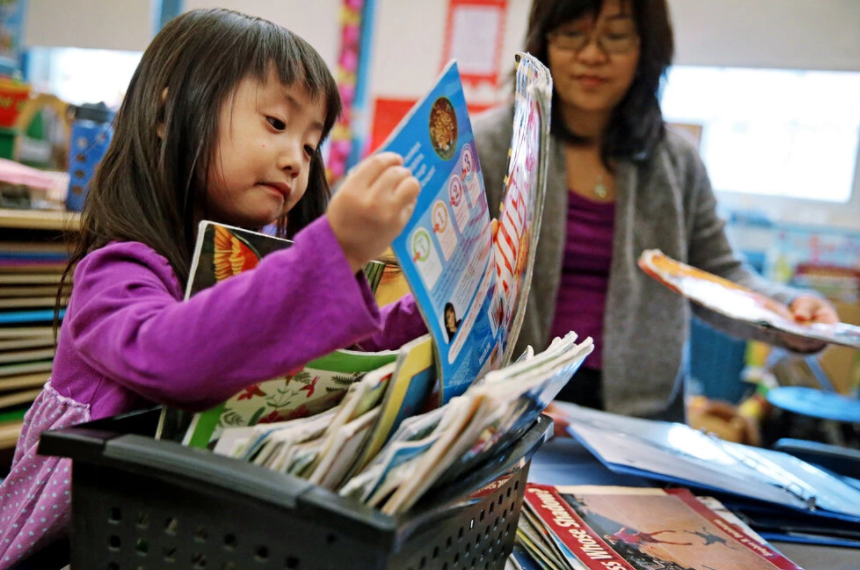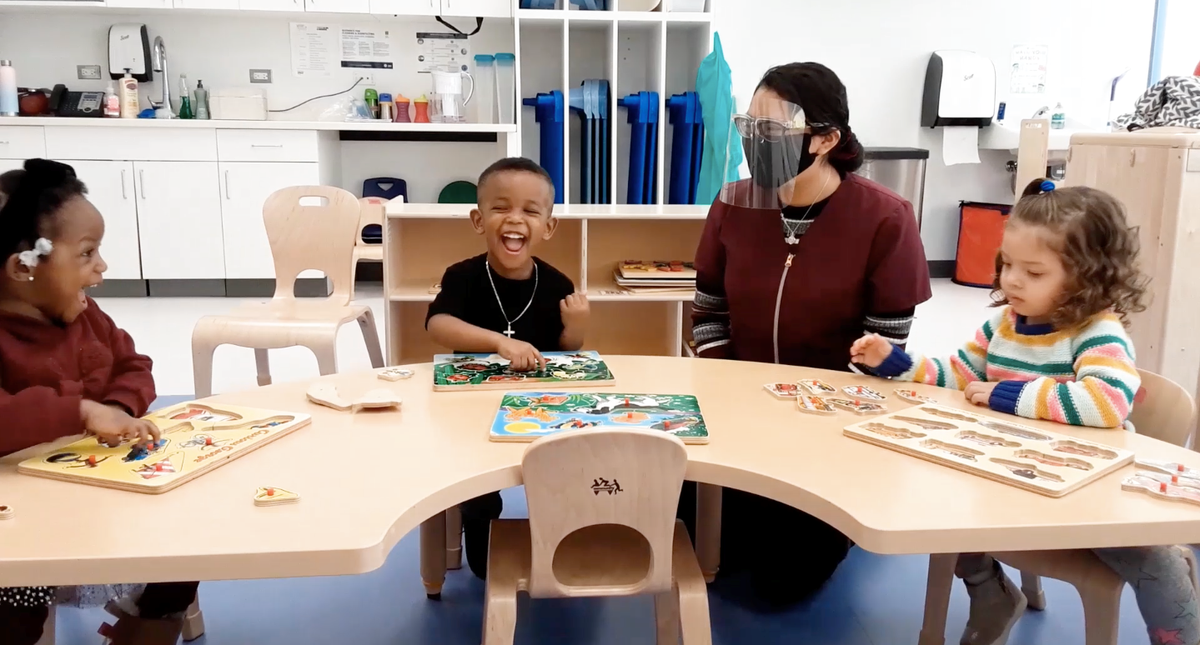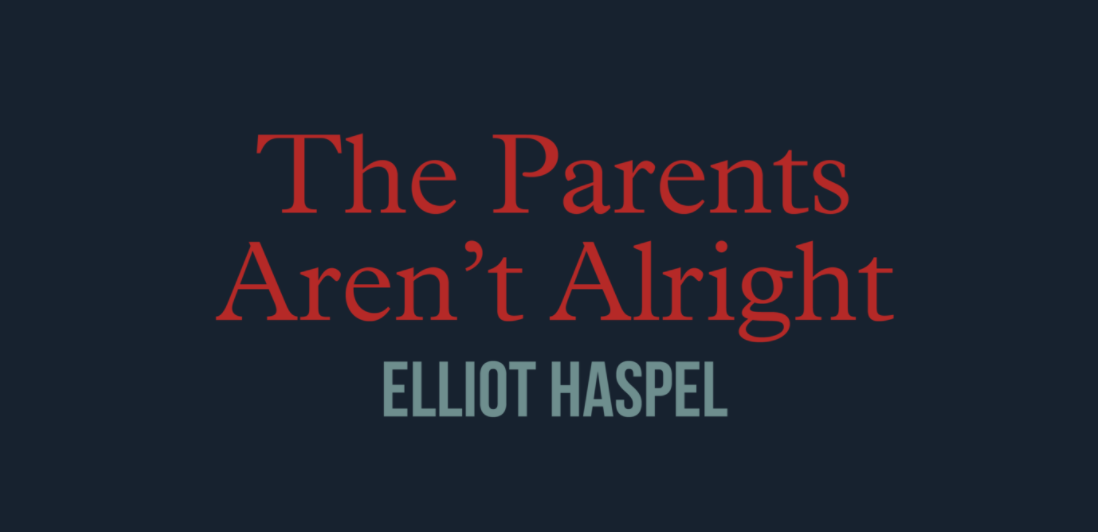Welcome to Starting Early. Every other week, we spotlight new reports, useful news, and engaging interviews with people doing important work in the field, and interesting takes on issues that matter.
The time of our lives that we remember the least — birth to age 5 — has the most profound impact on the rest of our lives. But our society has neglected for too long the education and care needs of infants, toddlers, and their families.
As Dr. Steven Barnett, director of the National Institute for Early Education Research, put it: “About half of the achievement gap we worry about at the end of high school is there before children walk through the kindergarten door.”
To better understand the child care crisis in the US, we spoke with education policy expert, author, and program officer at the Robins Foundation, Elliot Haspel.
Please read on and click through the links to go deeper.
1 Big Thing: We All Suffer When Child Care Workers Are Paid Too Little

Even before the pandemic, early educators were struggling to live on poverty-level wages.
- These low wages disproportionately harm women of color, who make up about 40% of the early educator workforce.
The problem: The child care industry operates with limited revenues on razor-thin margins and insufficient public funding. Caregiving and remote schooling during the pandemic forced many parents to leave the labor force, causing child care enrollment to take a deep dive.
- Compared to pre-pandemic enrollment, a study by Early Milestones Coloradoshows dramatic decrease in retention: 52% in child care centers, 27% in pre-K programs, and 66% in home-based child care as of July 2020.
Why it matters: Without a sufficiently-funded child care industry, parents with care responsibilities can’t rejoin the labor force.
When early care and education programs can’t keep qualified teachers, the economy suffers — as well as children and families.
- Parents forgo roughly $30-$35 billion in income because the high cost of early child care prevents them from working or causes them to work fewer hours in order to care for their children.
- The median wage for child care professionals was $12.24 per hour in 2020, according to the U.S. Bureau of Labor Statistics — lower than entry-level pay for large retail and fast food corporations like Starbucks, McDonalds, and Costco.
New policies under consideration: The American Families Plan proposed by the Biden Administration will provide $225 billion of direct support to children and families to:
- Establish universal access to high-quality, free Pre-K for 3- and 4-year-olds
- Invest in pay increases and professional development for the child care workforce
Learn more about what child care providers are up against because of pandemic.
2. Dispatches from the Field: Child Care in Crisis

Meet Elliot Haspel. Elliot began his career as a 4th grade public school teacher, and now serves as a program officer in education and policy research at the Robins Foundation. A talented writer, Elliot has published op-eds in the New York Times and The Atlantic, among several others. He curates a semi-monthly newsletter, The Parents Aren’t Alright.
Elliot’s work focuses on providing all children the opportunity to get a quality education and thrive academically. He shared:
“Care, generally, in America is devalued. This isn’t unique to child care. We see this with elder care as well, where there’s a sense that families should take care of their own problems, issues, and challenges. Care is seen as a familial responsibility, not a societal one. Somehow, it’s seen as transgressive if we keep society involved — that something’s gone wrong.”
We discussed:
- What the early child care system looks today and the implications of the COVID-19 pandemic on the industry
- The inspiration behind Haspel’s book Crawling Behind
- The need for philanthropy to step up in early child care
“With K-12 education, while there are plenty of problems and it is highly inequitable, there are a few positive things. It’s accessible to everyone. It’s free for everyone. There’s a slot for everyone and teachers are paid a reasonable wage with benefits. With early childhood, all that’s changed is the age of the kid, yet this system is radically different. It is incredibly hard to access. Navigating it is a huge burden on parents. And the practitioners are paid barely minimum wage.”
3. Pre-K Helps Kids Do Better in Life

A study released last month by economists at the University of Chicago, MIT, and Cal-Berkeley, examines the long-term effects of Boston Public Schools’ universal preschool program. A randomized research design was used to estimate the effects of large-scale public school in Boston on college attendance and preparation, standardized test scores, and behavior.
The findings for students attending public pre-K in the Boston trial:
- Greater high school graduation rates
- More likely to attend college
- Less likely be suspended and face juvenile incarceration
- Students did no better on standardized tests in elementary school, middle school, or high school
Why it matters: The benefits of preschool across race and income did not differ, suggesting that all students are likely to benefit from universal preschool.
Between the lines: The short-term impacts of preschool are evident in student behavior but not test scores. While measurement is valuable, researchers say public early education seems to improve children’s social and emotional skills — which helps build their resilience and maturity as teenagers and adults — more so than academic success.
Psychologist Allison Gopnik reflects in the “Preschool Sleeper Effect on Later Life”: “Maybe ‘preschool’ is a misnomer — the programs don’t work because they teach specific school skills. Instead, the crucial ingredients may be caring adults and a chance to play. Other research suggests that care and play don’t make you better at doing any one particular thing. Instead, they make you more robust and resilient, better able to deal with the unexpected twists and turns of fate. And, ultimately, that may be the best path to success.”
One Smile to Go: Wrapping Children and Families with Love and Support ❤️

The Burke Foundation Early Childhood Center at YWCA Princeton is a new center providing comprehensive, holistic birth-to-five child care in New Jersey.
Families in the Princeton and the Mercer County area were hesitant to bring their children back to child care, given fear and lack of information about the pandemic. Yet parents needed affordable and accessible child care in order to work.
The new Center opened in July, 2020 and welcomed families back safely, strengthening relationships between the YWCA’s educators and families. It provides children with stimulating and engaging experiences in newly-renovated, bright indoor and outdoor spaces.
Reducing barriers: Fees at the Center are between 14% – 24% lower than other local childcare providers, 54% of the children who learn at the Center are on subsidy or scholarship, and two healthy snacks are provided per day to ensure no children go hungry.
The recently renovated center offers:
- 6 infant and toddler classrooms
- 3 Pre-K classrooms
- Every classroom has bilingual teaching staff in every classroom
- A lactation room for nursing moms
- Extended hours to meet the need families’ needs in the community
- Such wraparound services like ESL classes, a Breast Cancer Resource Center, job- training programs such as Latinas Unidas, and collaboration with ArmInArm
Centering community: YWCA CEO Tay Walker envisions the Center as a family-training hub for community health workers, community doulas, center-based and family care providers – important jobs that will strengthen families and the community.
The Center’s services align with First Lady Tammy Murphy’s Nurture NJ Strategic Plan to improve Black maternal and infant health.
In a recent conversation she hosted with Ceil Zalkind of Advocates for Children of New Jersey and Congresswoman Bonnie Watson Coleman, Tammy Murphy noted that the Governor’s proposed state budget for the fiscal year starting July 1, 2021 includes over $900 million to expand, support, and invest in Pre-K. She shared:
“Despite the unprecedented fiscal challenges that COVID-19 posed to New Jersey, supporting our state’s care economy has continued to be in the forefront of our minds. It has been a central priority of our administration since Day One, and the pandemic only made it clearer that investing in families is critically important.”
Please help us spread the word about fall enrollment for the Center. Families can register here.

